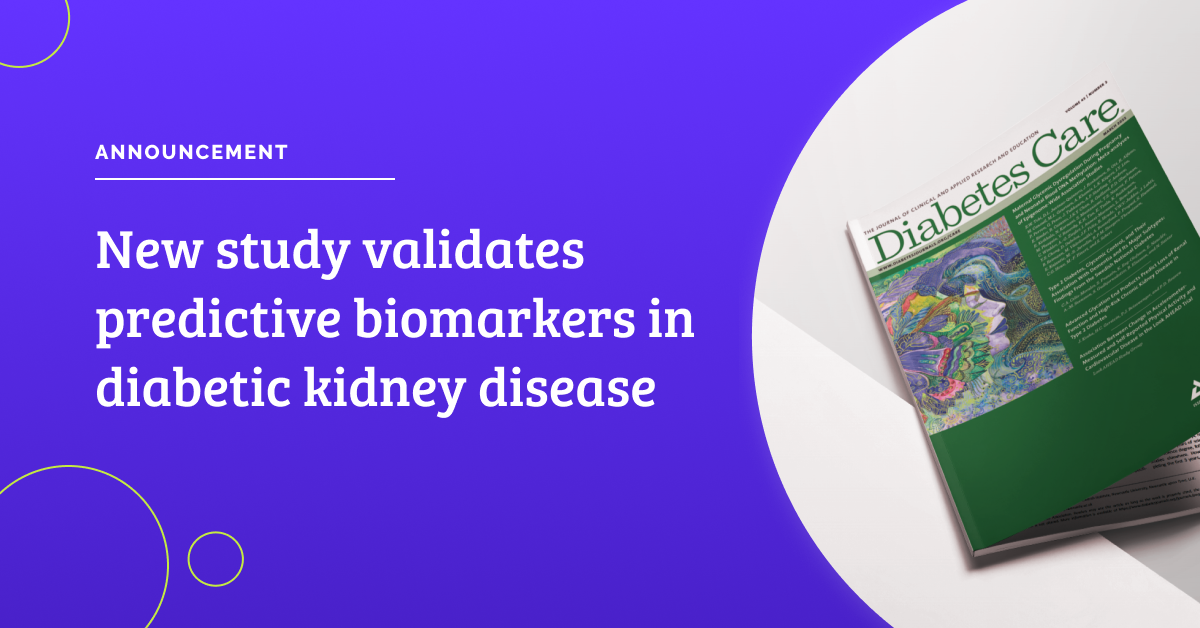Uncovering Early Indications of DKD Risk in Type 2 Diabetes
 A groundbreaking study just published in
Diabetes Care confirms that tracking a panel of predictive biomarkers, advanced glycation end products (AGEs), can reveal a person’s risk level for developing kidney complications with type 2 diabetes, supporting precision medicine when addressing kidney health.
A groundbreaking study just published in
Diabetes Care confirms that tracking a panel of predictive biomarkers, advanced glycation end products (AGEs), can reveal a person’s risk level for developing kidney complications with type 2 diabetes, supporting precision medicine when addressing kidney health.
Uncovering Predictive Biomarkers that Reveal Ongoing Kidney Health
Up to now, we’ve relied on a combination of commonly used blood and urine tests (along with kidney biopsies in advanced cases) to monitor kidney health. Unfortunately, these tests, which measure current glomerular filtration rate (GFR) and albumin, often indicate vulnerability only after reaching an advanced stage of reduced kidney function.
Surely, there has to be some indicator that can uncover the risk to kidney health earlier on, when medical and lifestyle interventions can preserve or even restore some level of kidney health.
Researchers, including Journey Biosciences’ Chief Medical Officer Dr. Paul Beisswenger, turned their attention to measuring predictive biomarkers in the blood.
The kidneys are central to clearing AGEs after they form as part of normal chemical reactions in the body.
Realizing this raised a couple of key questions:
-
Could a higher accumulation of AGEs indicate a risk of developing kidney complications?
-
And, could measuring a composite panel of these biomarkers provide an indicator for that risk far in advance of developing any symptoms of kidney problems?
Using data gathered from the foundational Action to Control Cardiovascular Risk in Diabetes (ACCORD) and Veterans Affairs Diabetes Trial (VADT) clinical trials, researchers set out to answer these questions.
They examined blood serum and plasma samples from two large cohorts of people with diabetes and found a relationship between the amount of certain AGEs that had accumulated and the likelihood that the person would experience reduced kidney function.
Then, they analyzed the data further to see if the relationship they uncovered between these predictive biomarkers accumulating and kidney health was present regardless of the person’s long term level of glycemic control.
Understanding whether the person’s level of glycemic control affects the risk for developing kidney disease is pivotal for managing kidney health with type 2 diabetes. Chronic hypoglycemia (high glucose levels) in people with diabetes points to a higher risk of kidney complications. For people with type 1 or in the early stages of type 2 diabetes, tight management of glucose levels has been shown to reduce this risk. But the same cannot be said for people with advanced (long term) type 2 diabetes.
In order to confirm that the accumulation of AGEs is a useful indicator of kidney health in people with type 2 diabetes, researchers needed to confirm the relationship they uncovered remained in force regardless of the person’s level of glycemic control. Researchers were able to confirm this within this study.
Predictive Biomarker Screening Supports Precision Medicine
As a result of their investigation researchers were able to define a composite risk score that reflects the likelihood of experiencing reduced kidney function in the long term. This score, based on a select panel of AGEs, accurately and consistently estimates a person’s risk level long before any symptoms arise or reduced kidney function is indicated by the commonly used blood and urine tests.
Having this composite risk score opens up new opportunities for early treatments and interventions that support long term kidney health. It gives people with diabetes and their healthcare providers a precise means to monitor and manage their ongoing kidney health.
Early screening results enable a precision medicine approach by pointing out the need for changes in diabetes care and management to support kidney health long before any measurable damage to kidney function is present.
Regularly scheduled screenings keep tabs on the progression of kidney health as the person with diabetes ages and experiences events that put their kidney health at risk, like needing to take certain painkillers that can over time affect the kidneys.
Having such a reliable way to uncover these risk levels early on makes it possible to respond in a timely manner with precision treatments and interventions. Ultimately, this helps ensure a better quality of life for the person with diabetes over the long term.
NaviDKD Puts This Study’s Findings Into Practice
With NaviDKD, we at Journey Biosciences have developed a simple blood screen that measures and reports on the accumulation of predictive biomarkers for kidney health. The results reflect the individual person’s risk level for developing kidney complications from diabetes, enabling it to be effectively addressed through precision medicine. To learn more, contact us.
About Journey Biosciences
Journey Biosciences is shifting the future of care through predictive innovations. Our flagship solution blends the precision of NaviDKD®, a clinically-validated predictive screening, with the AI-driven insights of Compass™, offering up to 12 years of advanced diabetes-related kidney disease (DKD) detection and tailored intervention strategies. This groundbreaking approach improves patient outcomes, optimizes resource allocation, and reduces costs. Discover more about our transformative approach at journeybio.life.
For media inquiries: media@journeybio.life




